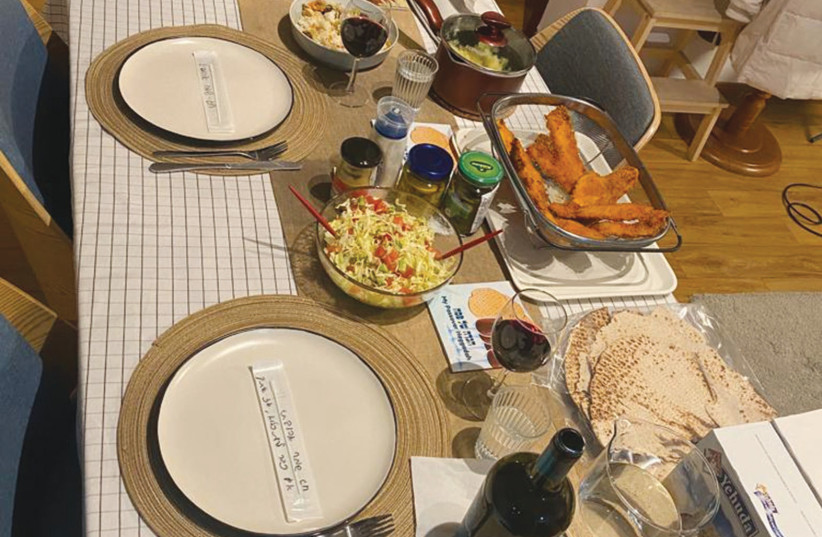For most Israelis, Passover of 2020, with its lockdowns, Zoom Seders and social distancing, has become a dim memory of the distant past. The pandemic has receded from the news, and the banner medical headlines that dominated our lives have been replaced with bulletins about judicial reform.
Yet, for the Jewish community of Shanghai, the memories of the pandemic Passover of 2022, with its strict lockdown, remain fresh in their minds, and are likely to be so for many years to come.
The community has had a long and varied history. Jews began arriving in the port city in the mid-1800s, when Elias David Sassoon, a Jew of Sephardi descent, came to Shanghai and established a branch of his Bombay-based firm which dealt in cotton, tea, opium and silk. By the beginning of the 20th century, the Sephardi Jewish community had built a synagogue and established a Hebrew school. Soon after, Russian Jews began to arrive from Siberia, Manchuria and North China. Following the Russian Revolution, the number of Russian Jews arriving in Shanghai increased.
The history of Shanghai's Jewish community
In November 1938, after Kristallnacht, Jews from Germany and Austria began to arrive in Shanghai, and later a group of students from the Mir Yeshiva came. By the end of World War II, the Jewish community in Shanghai numbered between 32,000 and 35,000. After the war, most of the Jews left and moved to Israel and other countries.
In recent years, approximately 3,000 Jews have been living in Shanghai, according to Rabbi Avraham Greenberg, who has served as an emissary (shliach) of Chabad in Shanghai since 2006. Greenberg’s brother, Rabbi Shalom Greenberg, was the first Chabad rabbi in Shanghai, and led the central branch of Chabad in the city, located in the Hongqiao neighborhood. Avraham became the rabbi at a second Chabad center in Pudong, a newer area of Shanghai.

“Shanghai is a modern, beautiful city,” says the 42-year-old Greenberg, who has a pleasant and friendly demeanor. “The majority of the people in the Jewish community are young families, people doing business here, and there are many students. It is challenging, but has a young and positive spirit.”
“The majority of the people in the Jewish community are young families, people doing business here, and there are many students. It is challenging, but has a young and positive spirit.”
Rabbi Avraham Greenberg
Before the pandemic, he says, Chabad operated three centers in Shanghai. Two were headed by the brothers Greenberg, and a third was operated by Rabbi Shlomo Aouizerat. “It was fun,” recalls Greenberg. “We had Shabbat services and meals for hundreds of people each week, we taught adult education classes, and we operated a Hebrew school in two locations for 70 children.”
Yael Farjun has lived in Shanghai for 13 years and says it is difficult to categorize the Jewish community of Shanghai. Farjun grew up in Eilat and works with a company that helps international firms enter the Chinese market.
“It is not just one community,” she says. “It is a combination of groups and communities. Among those groups, some are defined by religious affiliation, such as Chabad and another Sephardi group that is Orthodox. There is a liberal Jewish group, and there are French Jews, and there is also the Israeli community, which is not strictly affiliated with one group or another.”
Aviv and Roy Grinfeld, who have lived in Shanghai for five years, have enjoyed a pleasant Jewish life with other Israelis in Shanghai. Roy, who has spent nine years in China, heads a transportation design studio, and his wife, Aviv, runs the Israeli Dance Center.
“We have Shabbat dinners together, spend Shabbat together, and we have an opportunity to go to Chabad for dinner to celebrate the Jewish holidays with the rest of the Jewish community,” says Roy. “It doesn’t matter if you are religious or not. As Jewish people, we are always attached to our culture and our tradition, and it is something that is important to us. In Shanghai, it is possible.”
Jesse Golden-Marx, 31, arrived in Shanghai six months before the pandemic in late 2019. Born and raised in Saratoga Springs, New York, Golden-Marx has been conducting postdoctoral research at Shanghai Jiao Tong University. Since his arrival in Shanghai, he has become an integral part of the progressive Jewish community in the city, which is affiliated with the Union for Progressive Judaism, based in Australia.
In the past three years, Golden-Marx has led Shabbat and High Holy Days services for the progressive community, as well as Passover Seders.
“The Jewish community is really welcoming,” he says. “It’s made up of a mixture of Americans, Israelis and Europeans. Some people have Chinese spouses, and others, like me, are here for work. It’s a nice melting pot of a community.”
The COVID-19 pandemic comes to Shanghai, China
THE COVID-19 pandemic, which began in Wuhan in late 2019, caused a rapid decrease in the Jewish population of Shanghai, from several thousand to several hundred. Many foreigners residing in the city left and have not returned.
The virus was first reported to the local government on December 27, and on January 8, a new coronavirus – SARS-CoV-2 – was identified by Chinese scientists. By the end of January, the virus had spread to the mainland. China had adopted a zero-COVID policy, which combined aggressive public health measures and a containment phase, accompanied by the return of normal economic and social activities. While China was closed off from the world, the policy helped control the spread of the virus in much of China.
However, at the end of February 2022, the Omicron variant struck Shanghai, China’s largest city and a world hub of commerce, business and trade. The Chinese authorities responded to the outbreak with a strict lockdown of the entire city. This was the most extensive lockdown since the original outbreak in Wuhan in 2020. The lockdown began on April 1 in some areas of the city and expanded to the entire city on April 5.
Grinfeld recalls the unusual feeling of seeing a city of 26 million people shut down. “Our building was one of the last compounds in Shanghai to be locked down. We had the opportunity to walk around Shanghai and see the city completely empty. It was surreal to see empty roads, streets and parks.”
Greenberg explains that lockdown conditions in Shanghai were much more severe than in other countries. “When we were in lockdown, we couldn’t open the door of our house. There was no 500-meter allowance or 100-meter allowance.”

Passover 2022 in Shanghai
In 2022, Passover began on Friday evening, April 15, and Greenberg was the only Chabad emissary left in the city. His brother had left China in July 2021 and could not return, due to the pandemic, and the third Chabad shliach was also locked out.
“We realized that this Passover, everyone would celebrate in their homes,” says Greenberg.
With the lockdown in effect, how would the Jewish community of Shanghai get matzah for Passover?
“Every year, my brother receives the shipping container for all of China to the port in Shanghai,” says Greenberg.
The container arrived at the port after the lockdown in Shanghai had begun.
The Chinese authorities granted permission to locations outside Shanghai to receive their matzah allotment and take them to their locations, says Greenberg, but getting the matzah into Shanghai was more difficult. Food suppliers in the country were beginning to receive permission to deliver food, and he was able to find a delivery company in Shanghai that had the necessary authorizations to deliver the Passover packages, which included one kilo of matzah, matzo meal and wine, to the members of the Jewish community. Greenberg was delighted and thought that the problem was solved. He contacted the members of the community, verified their addresses and cellphone numbers, and began to relax.
Shortly thereafter, he received a phone call from the package delivery service. It was unable to deliver the packages, because the shipping container needed to be unpacked, and there were not enough workers available, due to the lockdown.
Greenberg was disconsolate. “It was one of the most difficult days of my life,” he recalls. “I’m in Shanghai, the matzah is here, just a few kilometers away, yet I can’t get it. I am the only shliach appointed by the Rebbe in the city. I realized that it was not going to be so simple.”
He recalls the date – the 11th day of the Hebrew month of Nisan, which was the birthday of the Lubavitcher Rebbe. He prayed.
Greenberg wrote to the community members and informed them that there was a snag. He asked anyone who might have some connection or way of getting the container released to contact him. Finally, one of the members of the community, who knew the owner of a large supermarket, called and said that the supermarket had an open time slot, during which it could unpack the container and deliver the Passover packages. Greenberg gave the go-ahead, and the mission began, while he hoped and prayed that the matzah would arrive.
The packages finally began to arrive at the homes of the members of the Jewish community.
“A man sent me a picture of the box of matzah that he had received,” says Greenberg. “When I saw the photo on my phone, I began to cry because the plan had succeeded. I still cry when I tell the story.”
That evening, Greenberg received photos continuously from community members, with broad smiles across their faces holding the boxes of matzah, “as if they had received $1 million,” says Greenberg. “Seeing their joy and happiness made it all worthwhile.”
He also singles out Eli Shapira, the Israeli consul-general in Shanghai at the time, who also helped deliver packages with his personal diplomatic vehicle, which was permitted to drive throughout the city to those who had ordered too late for the initial deliveries.
Greenberg’s assistance to members of the Jewish community extended beyond providing matzah and wine. A woman contacted him and requested additional foods and spices for Passover. Greenberg was able to arrange the delivery, as the ability to send packages had quickly improved. She then sent him a picture of her Passover Seder table, which consisted of pieces of white A4-sized paper glued together, since she did not have a tablecloth suitable for the Seder. In addition, she had no kosher-for-Passover plates of her own and had set the table with new plates she had originally purchased for her pets.
“I was heartbroken when I saw this. I couldn’t sleep after I saw her table,” he said.
Greenberg searched the Chabad center and found plastic plates and tableware, which he sent her to make her table suitable for the Seder.
The Jews of Shanghai received their matzah in time to observe Passover in 2022, despite the difficult lockdown conditions. Some conducted their Seders via zoom with friends in Israel or in Shanghai. Others celebrated the Seder in lockdown with immediate family members living in the same household.
The lockdown lasted two months, and in early January 2023 the Chinese government lifted virtually all of the remaining COVID restrictions it had placed on the people of Shanghai.
This year, Chabad and the Jewish community of Shanghai will celebrate Passover joyously and communally. Greenberg and others are optimistic that foreigners will soon return, and that the community in Shanghai will once again return to its place of prominence among the Jewish communities of China.■
